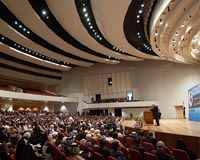| . |  |
. |
Washington (AFP) Nov 8, 2010 Former US president George W. Bush said Monday he initially opposed invading Iraq in discussions with aides before finally authorizing military force against Saddam Hussein. "I was a dissenting voice. I didn't want to use force," Bush said in an interview on NBC television as part of a series of appearances ahead of the release of his new book. "I was trying to give diplomacy a chance to work." Asked vice president Dick Cheney's influence on the decision to invade Iraq in 2003, Bush said in the end, "I was the guy who makes the decisions as to when we move." "And he (Cheney) might have been saying, 'Let's go.' But I said no," Bush added. In his 500-page "Decision Points," Bush wrote of his errors in the Iraq campaign and the failure to find weapons of mass destruction, which international intelligence reports strongly suggested Saddam had obtained. "No one was more shocked or angry than I was when we didn't find the weapons. I had a sickening feeling every time I thought about it. I still do," Bush wrote, according to excerpts. But on NBC, he refused to apologize to the American people for never finding weapons of mass destruction in Iraq -- which his administration had cited as its main motive to go to war -- and the chaos that followed in the years after the 2003 invasion. "Apologizing would basically say the decision was a wrong decision. And I don't believe it was the wrong decision," he said. Asked about the Abu Ghraib scandal and abuses committed by US soldiers to Iraqi detainees, Bush said his first reaction was to feel "sick to my stomach." "Not only have they mistreated prisoners, they had disgraced the US military and stained our good name," he added. The former president also confirmed that his then-defense secretary, Donald Rumsfeld, tendered his resignation at the time. Bush said he seriously thought about accepting the offer, but eventually declined because he could find no obvious replacement for Rumsfeld. "Now here's what happens. We're in the middle of war and if I couldn't have found somebody quickly to replace Secretary Rumsfeld, you'd have been on TV saying,' 'There's a vacuum at the Pentagon.' It's sending terrible signals to our troops," he said.
Share This Article With Planet Earth
Related Links Iraq: The first technology war of the 21st century
 Govt deal eludes Iraqi leaders as 28 dead in Shiite south
Govt deal eludes Iraqi leaders as 28 dead in Shiite southArbil, Iraq (AFP) Nov 8, 2010 Iraq's political leaders on Monday failed to agree on a proposed new power-sharing accord on the first day of all-party talks to break an eight-month deadlock as rival blocs stuck to their demands. While the Shiite, Sunni and Kurdish leaders said talks would continue in Baghdad on Tuesday and Wednesday, three car bombings in Iraq's mainly Shiite south killed at least 28 people, police and mi ... read more |
|
| The content herein, unless otherwise known to be public domain, are Copyright 1995-2010 - SpaceDaily. AFP and UPI Wire Stories are copyright Agence France-Presse and United Press International. ESA Portal Reports are copyright European Space Agency. All NASA sourced material is public domain. Additional copyrights may apply in whole or part to other bona fide parties. Advertising does not imply endorsement,agreement or approval of any opinions, statements or information provided by SpaceDaily on any Web page published or hosted by SpaceDaily. Privacy Statement |